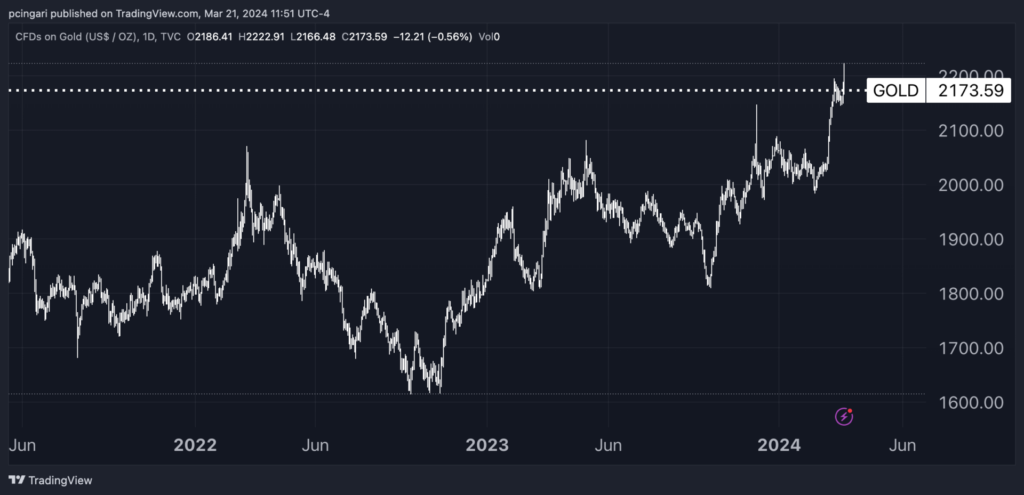Gold Investors Should Own These ETFs, Says Bank Of America: Why Analysts Expect Gold Spike To $2,600
Gold prices are projected to rise to $2,500-$2,600 per ounce, representing an attractive portfolio hedge for equity investors, according to a Bank of America report published this week.
As the precious metal surged to fresh record highs following the Fed March meeting, investment and ETF strategist Jared Woodard from Bank of America identified two primary engines driving gold’s unprecedented rally: its hedging quality and central bank purchases.
Chart: Gold Hit Record Highs Post-Fed March 2024 Meeting

Key Drivers Sending Gold To Record Highs
“Gold has the lowest correlation to the S&P 500 of almost any asset class and can act as a haven if inflation reaccelerates or growth slows later this year,” Woodard wrote.
Woodard highlighted that “central banks have been hoarding gold like never before,” accumulating over 2,100 tons in the past two years.
The expert also stressed that unlike previous rallies, the current surge in gold’s value has largely bypassed retail investors. This is evidenced by a 25% drop in total ETF gold holdings, suggesting that prices could have been even higher if retail participation mirrored that of institutional entities.
This gap presents a potential for increased demand, especially if yields decrease, possibly driving prices to the $2500-$2600 range, as predicted by Bank of America technical analyst Paul Ciana.
A Preference for Physical Gold ETFs Over Miners
When considering how to get exposure to gold, Woodard and his team advocate for physical gold ETFs, such as iShares Gold Trust Micro (NYSE:IAUM) and SPDR Gold Minishares Trust (NYSE:GLDM), which are less expensive than the SPDR Gold Trust (NYSE:GLD) and iShares Gold Trust (NYSE:IAU).
Physical gold ETFs are also preferred versus miner ETFs, as the former offers a more stable and direct exposure to the commodity’s value.
Bank of America showed that in the long timeframe, gold mining ETFs have not kept pace with their physical counterparts, partly due to the presence of mining companies disproportionately affected by downturns, diluting potential gains.
The expert recommended prioritizing mining stocks with a higher ratio of upside to downside beta, such as Barrick Gold Corp. (NYSE:GOLD) or Newmont Corp. (NYSE:NEM), to capitalize on gold’s positive trajectory while mitigating risk.
In the mining ETFs arena, Bank of America’s preference is on the iShares MSCI Global Gold Miners ETF (NYSE:RING) and the VanEck Gold Miners ETF (NYSE:GDX) as it “offers above average risk-adjusted returns and buy-rated stock exposure” compared to Sprott Gold Miners ETF (NYSE:SGDM) and VanEck Junior Gold Miners ETF (NYSE:GDXJ)
Read now: Fed’s Dovish Stance Ignites Market Rally: ‘Everybody Is Bullish,’ Veteran Wall Street Investor Says
Photo: Shutterstock
